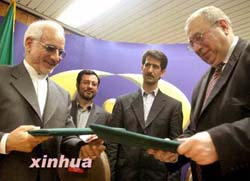Russia careful on nuclear talks with Iran
Russia expressed limited hope Monday as Russian and Iranian officials started talks in Moscow on an offer to enrich uranium for Iran, seen as a final opportunity for the Islamic regime to avoid the threat of international sanctions over Western concerns it is developing nuclear weapons. "Honestly speaking, we have modest expectations, but we will make every effort to avoid an escalation of the situation and the use of force," Russian Foreign Minister Sergey Lavrov told a government meeting chaired by President Vladimir Putin in televised comments shortly before the talks began.

The top Iranian negotiator, Ali Hosseinitash, deputy secretary of the Supreme National Security Council, took a tough stance before the meeting, rejecting any link between the Russian plan and demands for Iran to restore a freeze on uranium enrichment, news agencies reported. "The negotiations with Russia do not foresee any preconditions," Hosseinitash said, according to ITAR-Tass, stressing that Iran did not intend to renounce its right to conduct a full nuclear cycle.
The Russian offer, backed by the United States and Europe, represents a chance for Iran to address the West's concerns before a March 6 meeting of the U.N. nuclear watchdog, the International Atomic Energy Agency, which could start a process leading to punishment before the U.N. Security Council.
Iran's Foreign Minister Manouchehr Mottaki, who was holding talks Monday with European leaders in Brussels, Belgium, said Tehran was looking for a "peaceful solution" to the impasse and was ready to listen to "new ideas."
But the Iranians have blown hot and cold over Moscow's initiative, under which Iran's enrichment activities would take place on Russian soil to ensure no uranium is diverted for nuclear weapons. Enrichment is a process that can produce either fuel for a nuclear reactor or material for a warhead.
Iran maintains its nuclear program is purely for civilian energy needs, but Western nations accuse it of pursuing a secret atomic weapons drive that would upset the regional balance of power in the Middle East. The United States has said it is committed to addressing the Iran standoff diplomatically, but that it reserves the right to use any option, including force.
The Russian foreign minister said Iran could conduct all nuclear activities on its own soil once the IAEA had lifted all concerns about the Iranian nuclear program.
Lavrov said last week that the Russian proposal is conditional on Iran giving up all enrichment activity, including small-scale efforts it started last week. The European Union and the United States also insist that Tehran re-impose a freeze on all enrichment.
Analysts warned against expecting a decisive outcome Monday, saying a concrete result would more likely emerge from further talks when the head of Russia's atomic energy agency, Sergei Kiriyenko, visits Iran on Thursday.
Experts have said Iran would like its scientists to have access to the Russian enrichment facility and hope to retain the right to conduct some part of the enrichment process at home. But Former Russian Atomic Energy Minister Viktor Mikhailov told the Vremya Novostei daily in comments published on Monday that the entire facility would be off-limits.
IAEA chief Mohammed ElBaradei recently suggested that the international community might have no choice but to accept small-scale enrichment on Iranian soil as a condition for Tehran to agree to move its full program abroad, a diplomat familiar with ElBaradei's thinking said Sunday.
Iranian presidential spokesman Gholamhossein Elham, speaking in a news conference Monday, welcomed the IAEA proposal on small-scale enrichment inside Iran as a "positive step" toward resolving the nuclear dispute, but said that any restrictions on Tehran's right to access nuclear energy were unacceptable.
For Russia, this week's talks are an opportunity to stave off the threat of action against a country where it has strong interests, it is building Iran's first nuclear power station _ and win prestige by helping find a solution to a conflict in which it was long seen as part of the problem.
But the price would be high for Iran, at least in terms of pride: giving up enrichment efforts at home, even temporarily, goes against its leaders' adamant insistence on their right to conduct the process as part of what they say is a peaceful nuclear energy program, reports the AP.
N.U.
Subscribe to Pravda.Ru Telegram channel, Facebook, RSS!


